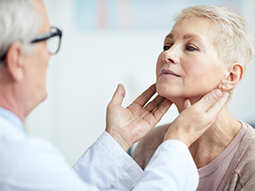
The endocrinology team at MedStar Health has extensive experience in the diagnosis and treatment of a wide range of endocrine-related reproductive disorders. These disorders affect the organs and hormones critical to development, sex hormone production, fertility, and aging in both women and men.
Our specialists work closely with other doctors, including internists, urologists, obstetrician/gynecologists, and fertility specialists to offer patients the most advanced care and treatment.
We understand the significant personal challenges facing anyone with a reproductive disorder or experiencing normal reproductive changes, such as menopause. We approach every patient, family, and situation with the utmost respect, compassion, and hope for the best possible outcome.
Conditions
Among the reproductive disorders we treat are:
Virilization: This occurs when the adrenal glands or ovaries over-produce male hormones, causing women to develop male characteristics, including facial hair, baldness, and a low voice.
Rarely, a hormone-producing tumor in or outside the adrenal gland causes the imbalance. Other causes may include abnormal production of proteins in the adrenal glands or cysts in an ovary.
Treatment depends on its underlying cause and may include surgery or medication.
Hirsutism: This occurs when a woman over-produces male hormones and grows thick, dark hair on her body. While the condition itself is usually not dangerous, it is important to have an evaluation. It can also indicate another underlying problem, such as polycystic ovary syndrome (PCOS), an adrenal gland or ovarian tumor, Cushing's syndrome or abnormal production of hormones in the adrenal glands or of male hormones in the ovaries.
Treatment will depend on the cause and could include surgery, weight loss, or medications.
Treatment for abnormal hair growth could include:
-
Birth control pills
-
Anti-androgen medications
-
Creams to slow the growth of facial hair
-
Bleaching or laser and non-laser light hair removal
Polycystic ovary syndrome (PCOS): This is a disorder in which a woman's hormones are out of balance, affecting menstruation, causing symptoms such as unwanted hair growth and acne, and decreasing fertility. Some women with PCOS grow many small cysts on their ovaries. Over time, PCOS can lead to associated health problems, such as diabetes and heart disease.
We work with patients and their internists, obstetrician/gynecologists, and fertility specialists to develop a treatment plan that could include a combination of healthy lifestyle changes and medication. For hormonal imbalance and irregular periods, medication could include:
-
Birth control pills or progesterone pills to help keep periods regular
-
Metformin to increase the body's sensitivity to insulin and help with symptoms and regulate the cycle. For some women, this drug can also help with weight loss and fertility.
Primary ovarian insufficiency (POI): This is a condition that occurs when a woman’s ovaries stop working normally before she reaches the age of 40. POI is not the same as early or premature menopause.
Treatment includes reducing symptoms related to low estrogen levels, as well as preventing bone loss that results from reduced ovary function. Estrogen replacement therapy is the primary medication utilized.
Hormone-secreting ovarian tumors: These are growths on the ovaries that secrete hormones in addition to those normally produced by the ovaries, primarily estrogen and progesterone. To treat these tumors, we first identify the source and type of hormones produced. Then, we collaborate with the patient’s gynecologist to develop a treatment strategy. These tumors occur infrequently.
Congenital adrenal hyperplasia: This is a collection of genetic conditions that prevent the adrenal glands' ability to make certain hormones, most often cortisol. Two other kinds of hormones also may be affected, including aldosterone and androgens. The disorder affects both men and women and can cause problems with growth and development in children, including normal development of the genitals.
Male hypogonadism/testosterone deficiency/”low T”: This is a condition in which a man doesn’t produce enough testosterone —the hormone that plays a key role in masculine growth and development during puberty, and affects strength, moods, and libido later in life. The recommended treatment is to increase low serum testosterone levels with testosterone replacement therapy once the diagnosis is confirmed.
Menopause: This is the natural condition in which menstruation stops and estrogen levels decline. Low estrogen levels can cause symptoms such as hot flashes, night sweats, vaginal dryness, pain with intercourse, and decrease in bone density (brittle bones). We first treat menopause symptoms and work to prevent bone loss that may result from reduced ovarian function. Most often, we will prescribe low doses of replacement estrogen, with or without progesterone.
When treatment with estrogen is not appropriate, treatment could include antidepressants to help reduce the challenging symptoms of menopause.
Transgender medicine: Transgender medicine services includes cross-sex hormone administration and referrals to urologists, general surgeons, and gynecologists for surgical options if these are desired.
Our providers

Expert endocrinology care
Getting the care you need starts with seeing one of our endocrinologists.









